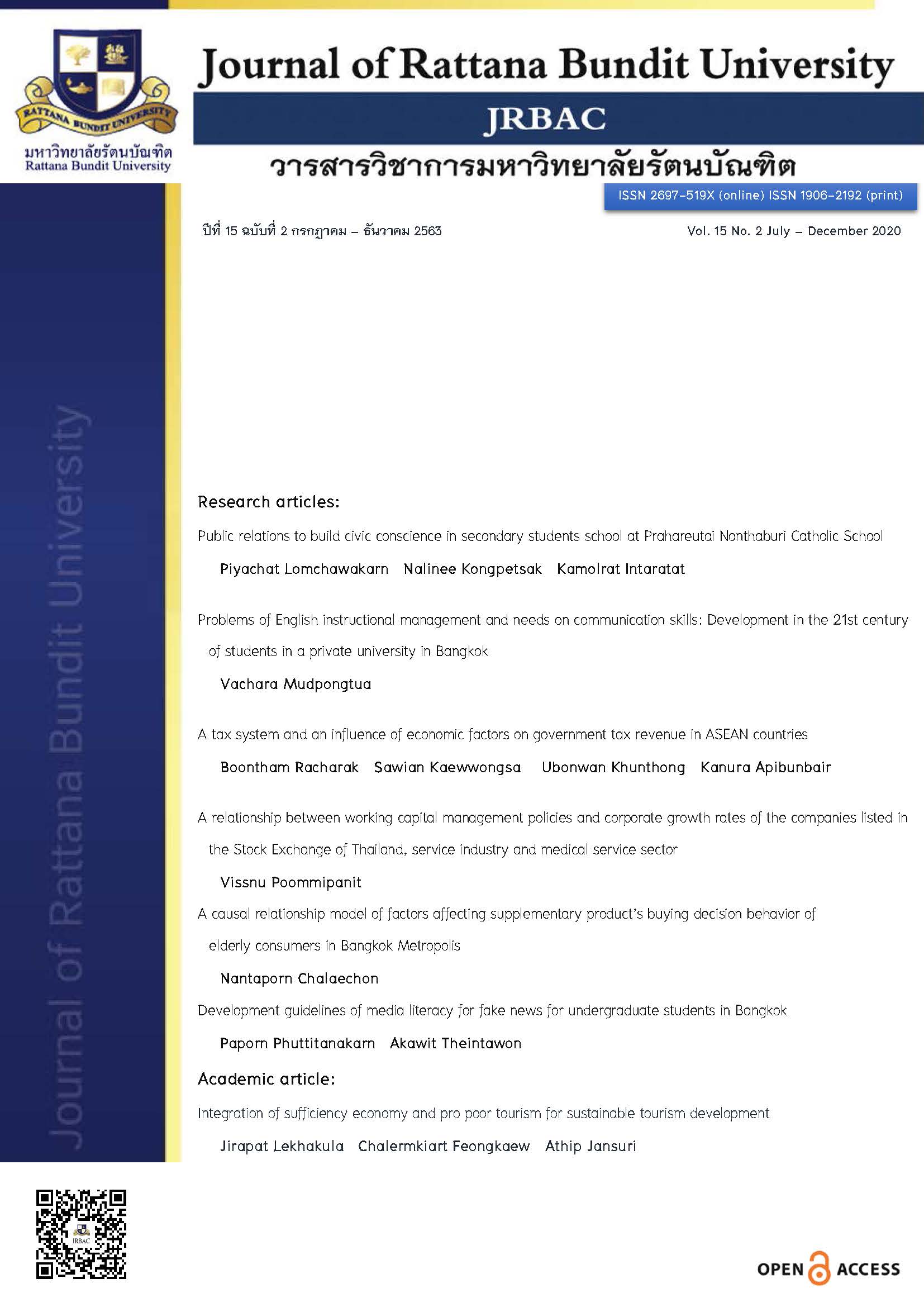Integration of sufficiency economy and pro poor tourism for sustainable tourism development
Main Article Content
Abstract
A poverty is the top issue around the world, and poverty alleviation is usually included in the country’s sustainable development goals as priority. In order to achieve this goal, tourism is currently becoming the main issue to discuss because it is a potential tool to generate growth in aggregate revenues of a country, which consequently distributed to the poor. This article does emphasis on the integration of new theory of Sufficiency Economy Philosophy (SEP) and Pro-Poor Tourism (PPT) to improve people’s quality of life in the tourist attractions and have better livelihood by efficiently utilizing their land and water resources. This could lead to an understanding of community-based tourism management as well as the engagement and cooperation of its people to develop the tourism attraction to reach its maximum capacity. Each community has their own capability for self-reliance, which is in line with the vision of Thailand’s 20-year National Strategy, aiming the country to be stable, prosperous and sustainable as a developed country.
Article Details
References
Altieri, M.A. and Masera, O. (1993) Sustainable rural development in Latin America: Building from the bottom-up. Ecological Economics, 7(2), 93-121.
Andereck, K. L. & Nyaupane, G. P. (2011). Exploring the nature of tourism and quality of life perceptions among residents. Journal of Travel Research, 248-260.
Andrew, H. H. (2013). Explaining and understanding poverty. In Tourism, Poverty and Development. New York: Routledge.
Ashley, C., Roe, D., & Goodwin, H. (2001). Pro-poor tourism strategies, expanding opportunities for the poor. Pro-poor tourism briefing, no. 1.
Chaipattana Foundation. (2016). Philosophy of sufficiency economy. Bangkok: Chaipattana foundation. (in Thai).
มูลนิธิชัยพัฒนา. (2559). พระราชดำริว่าด้วยเศรษฐกิจพอเพียง. กรุงเทพฯ: มูลนิธิ.
Chiangkul, W. (2004). Sustainable of poverty allevation. Bangkok: Amarin Printing. (in Thai)
วิทยากร เชียงกูล . (2547). พัฒนาการแบบยั่งยืนกับการแก้ปัญหาคนจน. กรุงเทพฯ: อัมรินทร์พริ้นติ้ง.
Dillys Roe and Harold Goodwin Caroline Ashley. (2001). Pro-Poor Tourism Strategies: Expanding Opportunities for the Poor. London: University of Greenwich.
Holden, Andrew. (2013). Explaining and understanding poverty. In Tourism, Poverty and Development. New York: Routledge.
Jamieson, W., Goodwin, H., & Edmunds, C. (2004). Contribution of tourism to poverty alleviation pro-poor tourism and the challenge of measuring impacts. Retrieved from https://haroldgoodwin.info/resources/povertyalleviation.pdf
Jeon, M. M., Kang, M. M., & Desmarais, E. (2011). Residents’ perceived quality of life in a cultural-heritage tourism destination. Applied Research in Quality of Life, 105-123.
Kim, K., Uysal, M., & Sirgy, M. J. (2013). How does tourism in a community impact the quality of life. Tourism Management, 36, 527-540.
Meeberg, G. A. (1993). Quality of life: A concept analysis. Journal of advanced nursing, 32-38.
Nuchnum, P. & Siriwong, P. (2015). The Meaning and Origin of Saving, Saving Process, Saving Problems and Obstacles Based on the Philosophy of Sufficiency Economy of Government Officials of Kanchanaburi Provincial Administration Organization. Veridian E-Journal, Silpakorn University, 8(1), 387-404. (in Thai)
พิจิตรา นุชนุ่ม และพิทักษ์ ศิริวงศ์. (2558). การให้ความหมายและที่มาของความหมาย กระบวนการออมเงิน ปัญหาและอุปสรรค ในการออมเงิน ตามแนวทางปรัชญาเศรษฐกิจพอเพียง ของข้าราชการองค์การบริหารส่วนจังหวัดกาญจนบุรี. วารสารมหาวิทยาลัยศิลปากร, 8(1), 387-404.
Office of Academic Division of Samui Municipality (2016) Develop Plan of Samui Municipality 3 years. Bangkok: Ministry of Interior. (in Thai)
กองวิชาการและแผนงานเทศบาลนครเกาะสมุย. (2559). แผนพัฒนาเทศบาลนครเกาะสมุยสามปี (พ.ศ. 2560-2563). กรุงเทพฯ: กระทรวงมหาดไทย.
Office of Secretary of National Strategy Board. (2017). National Strategy Board 2018 – 2037. Bangkok: Office of the National Economic and Social Development Board. (in Thai).
สำนักงานเลขานุการของคณะกรรมการยุทธศาสตร์ชาติ. (2560). ยุทธศาสตร์ชาติ พ.ศ. 2561 - 2580. กรุงเทพฯ: สำนักงานคณะกรรมการพัฒนาการเศรษฐกิจและสังคมแห่งชาติ.
Office of the Royal Development Projects Board. (2012). Great philosopher of developing new theories. Bangkok: Amarin Printing. (in Thai)
สำนักงานคณะกรรมการพิเศษเพื่อประสานงานโครงการอันเนื่องมาจากพระราชดำริ. (2555). จอมปราชญ์แห่งการพัฒนาทฤษฎีใหม่. กรุงเทพฯ: อมรินทร์ พริ้นติ้ง.
Office of the National Economic and Social Development Board. (2007). Philosophy of sufficiency economy. Bangkok: Sub-Committee of Sufficiency Economy. (in Thai).
สำนักงานคณะกรรมการพัฒนาเศรษฐกิจและสังคมแห่งชาติ. (2550). ปรัชญาเศรษฐกิจพอเพียง. กรุงเทพฯ: คณะอนุกรรมการขับเคลื่อนเศรษฐกิจพอเพียง.
Office of the National Economic and Social Development Board (2018). Thailand poverty situation and inequality income report. Bangkok: Office of the National Economic and Social Development Board. (in Thai).
สำนักพัฒนาฐานข้อมูลและตัวชี้วัดภาวะสังคม. (2561). รายงานสถานการณ์ความยากจนและความเหลื่อมล้ำด้านรายได้ในระดับภาคของประเทศไทย. กรุงเทพฯ: สำนักงานคณะกรรมการพัฒนาการเศรษฐกิจและสังคมแห่งชาติ.
Office of the Permanent Secretary. (2019). Thailand Revenue of Tourism Report 2019. Bangkok: Department of Economics of Tourism and Sports. (in Thai).
สํานักงานปลัดการท่องเที่ยวและกีฬา. (2562). รายงานรายได้จากการท่องเที่ยวในปี พ.ศ. 2562. กรุงเทพฯ: กองเศรษฐกิจการท่องเที่ยวและกีฬา.
Orpia, C. B. (2014). Analysis of the involvement and impressions of the local community on the Tourism Development of Ilocos Norte. Retrieved from https://api.semanticscholar.org/CorpusID:140684471
Panpiemras, K. (2006). Sufficiency economy and the National Economic and Social Development Plan 10. (Lecture, 24 November 2006, Santi Maitree Building Government House, Bangkok). (in Thai)
โฆษิต ปั้นเปี่ยมรัษฎ์. (2549). แนวทางการพัฒนาประเทศในช่วงแผนพัฒนาฯ ฉบับที่ 10 ภายใต้หลักปรัชญาของเศรษฐกิจพอเพียง (คำบรรยาย, 24 พฤศจิกายน 2549, ตึกสันติไมตรี ทำเนียบรัฐบาล, กรุงเทพฯ)
Pongponrat, K., & Division., M. U. M. U. I. C. T. I. M. (2015). Pro-poor tourism at Samui Island, Thailand: A case study of local governance.
Roe, D., Goodwin, H., & Ashley, C. (2001). Pro-poor tourism strategies: Expanding opportunities for the poor. London: University of Greenwich.
Rojulai, N., Aminudin, N., & Anuar, N. A. M. (2018). A conceptual framework of tourism development perceived impact, quality of life and support for tourism further development: A case of Malaysia Homestay experience programme (MHEP). International Journal of Academic Research in Business and Social Sciences, 8(16), 339–355.
Tourism Authority of Thailand. (2004). Pro-poor tourism]. Bangkok: eTAT Tourism Journal eTAT Tourism Journal, 4, 1-8. Retrieved from http://www.etatjournal.com/web/menu-download-zone/menu-dl-etatjournal/439-dl-etatjournal-42547 (in Thai).
Townsend, P. (1979). Poverty in the United Kingdom. Harmondsworth: Penguin.
U UNDP. (1995). The Copenhagen declaration and programme of action: World summit for social development, 6–12 March 1995. New York: UN.
United Nation. (2019). Sustainable development goals. Retrieved from https://www.undp.org/content/undp/en/home/sustainable-development-goals.html
World Travel and Tourism Council. (2018). Defining the economic contribution of travel & tourism. In Travel & tourism economic impact 2018 Thailand (p. 2). London: The authority on world travel & tourism.
Watanachai, K. (2012). Sufficiency economy and education management of Thailand. Nonthaburi: Impact Exhibition and Convention Center, Muang Thong Thani. (in Thai).
เกษม วัฒนชัย. (2555). ปาฐกถาพิเศษเรื่อง เศรษฐกิจพอเพียงกับการจัดการศึกษาของชาติ. ใน การประชุมประจำปี และจัดแสดงนิทรรศการ เรื่อง "อะไร คือเศรษฐกิจพอเพียง". นนทบุรี: ศูนย์แสดงสินค้าและการประชุม อิมแพ็ค
เมืองทองธานี.
Yusof, Y., Ibrahim, Y., Muda, M. S., & Amin, W. M. (2012). Community based tourism and quality of life. Review of Integrative Business and Economics Research, 336.


